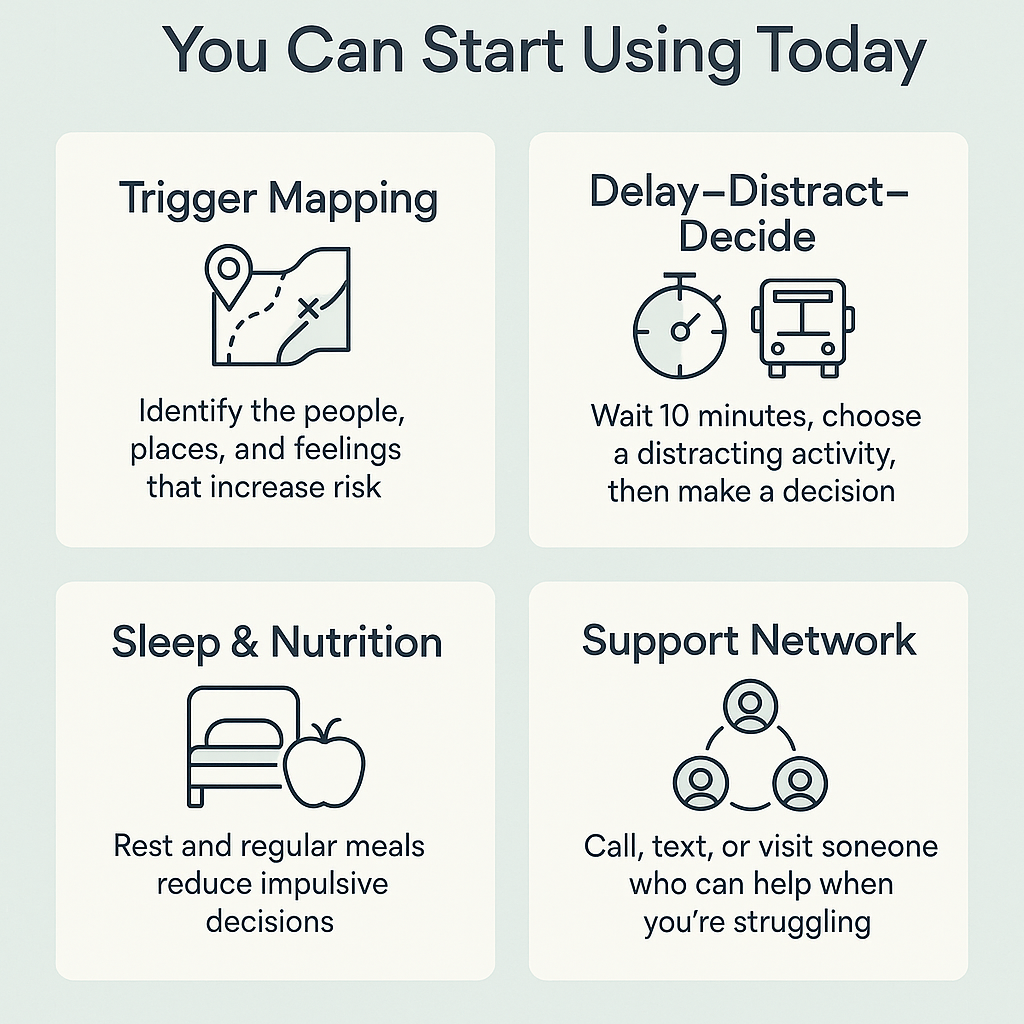
Facing a DWI in Queens?
We’re here to help—respectfully, confidentially, and fast.
“We meet you with respect, confidentiality, and practical next steps. Our job is to help you stabilize the situation, protect your future, and support meaningful change—at your pace, with your goals in mind.”
DWI/DWAI in New York— What It Means in Plain English
DWI: Operating a vehicle with a blood alcohol concentration (BAC) of 0.08 or higher—or while impaired by drugs or a combination.
DWAI: Lower impairment but still serious
Possible outcomes: License suspension/revocation, fines, surcharges, possible jail, mandated education/treatment.
We don’t provide legal advice; we help you align clinical services with court and DMV expectations and coordinate with your attorney/probation (with your consent).
Why It Feels like “Everything at Once”
Transportation: License limits disrupt work, school, childcare, medical visits.
Work/School: Balancing court, classes, treatment with shifts and exams
Finances: Legal/DMV fees, interlock devices, insurance changes, transit costs.
Family: Shame, fear, conflict; loved ones unsure how to help.
Emotional Health: Anxiety, poor sleep, low mood; temptation to “white-knuckle” it.
It’s okay—there’s a structured way through it.
How AHS Helps (Evidence-Based, Judgment- Free)
-
Brief, respectful; validated tools to match the right level of care (and any court/DMV needs).
-
risk awareness + court/DMV documentation
-
CBT, MI, relapse prevention
-
anxiety, depression, ADHD, trauma
-
naltrexone/acamprosate (when appropriate)
-
with your permission
-
timely updates to attorney/probation (with consent)
Treatment + Compliance, Working Together
Court & Attorney Collaboration (verify enrollment; progress updates)
DMV/Education Coordination (hours, certificates, attendance)
Documentation That “Speaks the Language”
Goal: Reduce confusion, reduce risk, keep you moving forward.
Your First Weeks with AHS
Call or Visit - We’ll book the earliest opening and tell you what to bring (ID, court papers, insurance if you have it; self-pay and sliding scale available).
Intake & Screening (60–90 min) - Private, respectful, confidential.
Assessment (if indicated) - Deeper look if risky use/SUD is suspected or required.
Personalized Plan & Schedule - Written plan for groups/individual sessions, education, and a calendar that fits work/school/family; day or evening options.
Progress Check-Ins - Adjust the plan and keep documentation current for deadlines.
Have court paperwork? Bring it.
Practical Tools You Can Use Today
Those are coping and safety tools often taught in substance use treatment and relapse prevention. Each one is simple, but powerful when practiced.
-
What it is: Identifying people, places, feelings, or situations that raise the risk of using alcohol or other substances.
How it helps: By mapping triggers, you can see patterns (e.g., “stress after work,” “certain friends,” or “late-night loneliness”) and plan in advance.
Example: If driving past a certain bar is a trigger, you plan an alternate route home.
-
What it is: A quick 3-step method to ride out cravings.
Delay acting on the urge (even 10–15 minutes).
Distract yourself with another task (text someone, walk, drink water).
Decide afterward if the urge still feels as strong.
How it helps: Cravings usually peak and fade within minutes. This technique gives space to avoid acting impulsively.
-
What it is: Having safe, sober alternatives ready for risky moments.
How it helps: Prevents “I had no choice” situations.
Example: Saving rideshare apps, bus/train routes, or having a trusted friend you can call before driving impaired.
-
What it is: Prioritizing rest and balanced meals.
How it helps: Poor sleep and low blood sugar both increase stress and impulsivity. Taking care of basic needs lowers relapse risk and improves emotional stability.
Example: Eating a snack before social events so hunger doesn’t make you more vulnerable to cravings.
-
What it is: A circle of people you can reach out to when stressed or triggered.
How it helps: Connection builds accountability and breaks isolation, which is a common relapse risk.
Example: Two friends you can text before driving or going out; a peer support group; a trusted family member.
These tools work best when personalized—written down, practiced, and refined over time.
Frequently Asked Questions
-
Seeking help is not an admission of guilt.
Many clients begin services early to demonstrate responsibility and to manage personal risk.
Your attorney can advise you on timing and strategy; we’ll support whichever path you choose.
-
Some clients benefit from a brief, skills‐based education course and a safety plan; others need a bit more support.
We’ll determine the right level of care through screening and/or assessment.
The goal is to match services to need—no more, no less.
-
Length varies based on your plan and any court/DMV requirements.
We’ll build a schedule that’s realistic for you and keep you informed about milestones and documentation.
-
We’ll discuss payment options and design an appointment schedule that respects your job and family responsibilities, including evening availability.
-
Yes. With your written consent, we can coordinate care and provide the specific updates they need.



